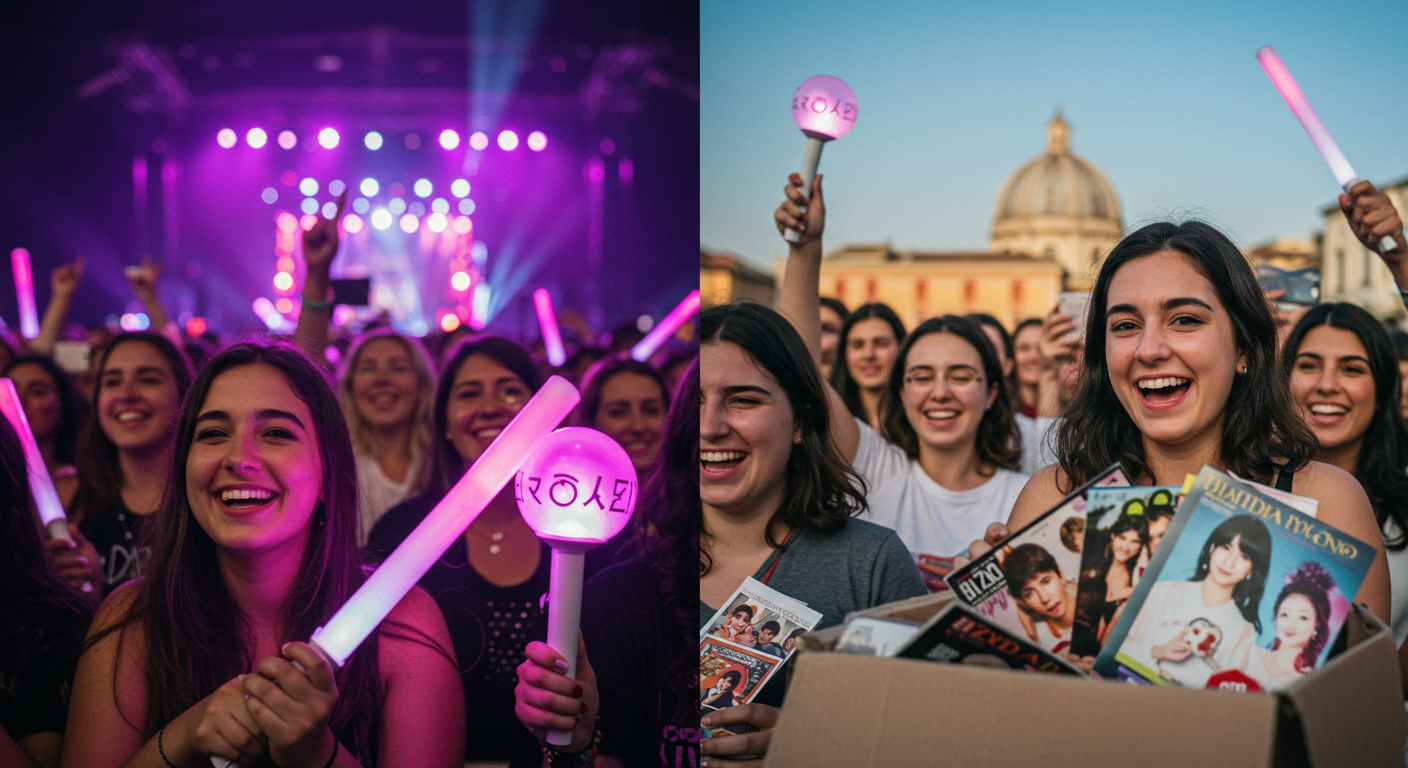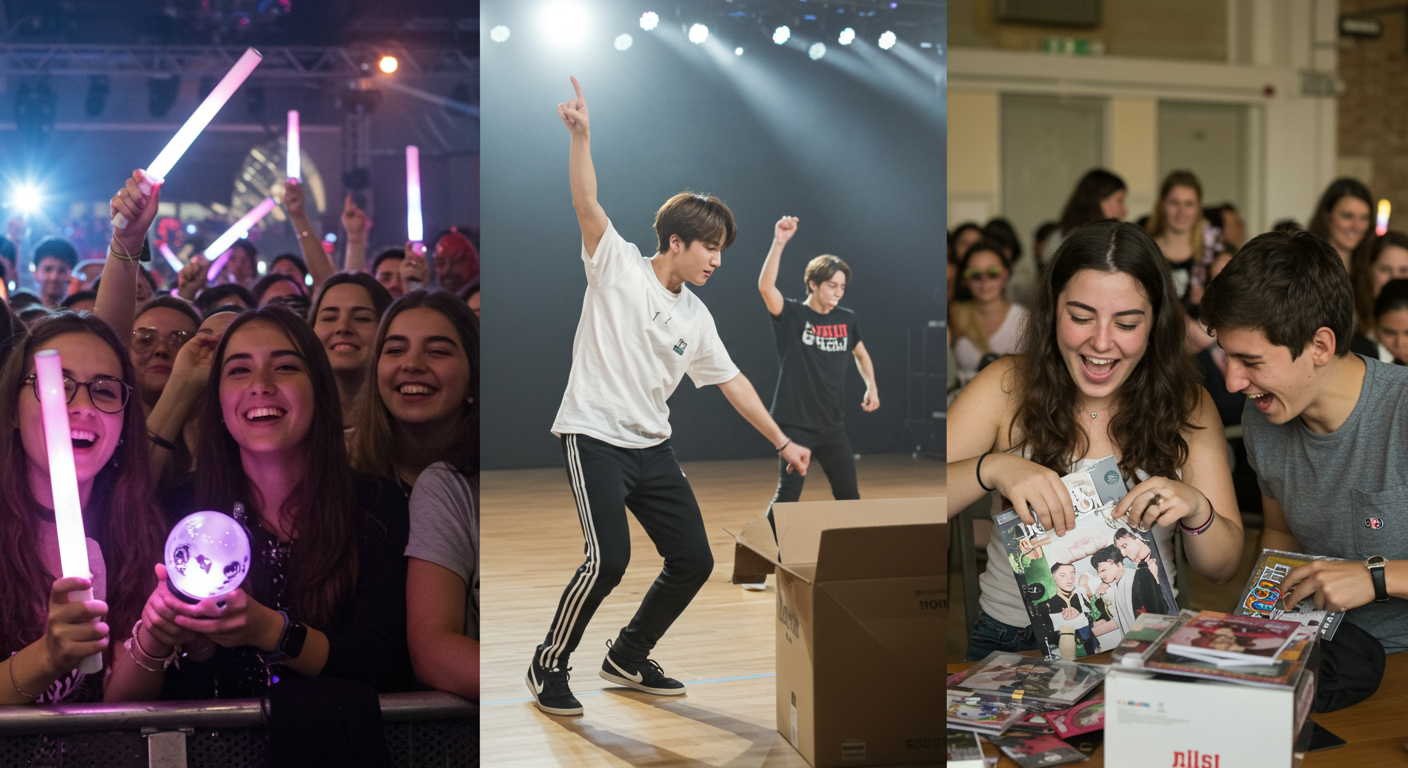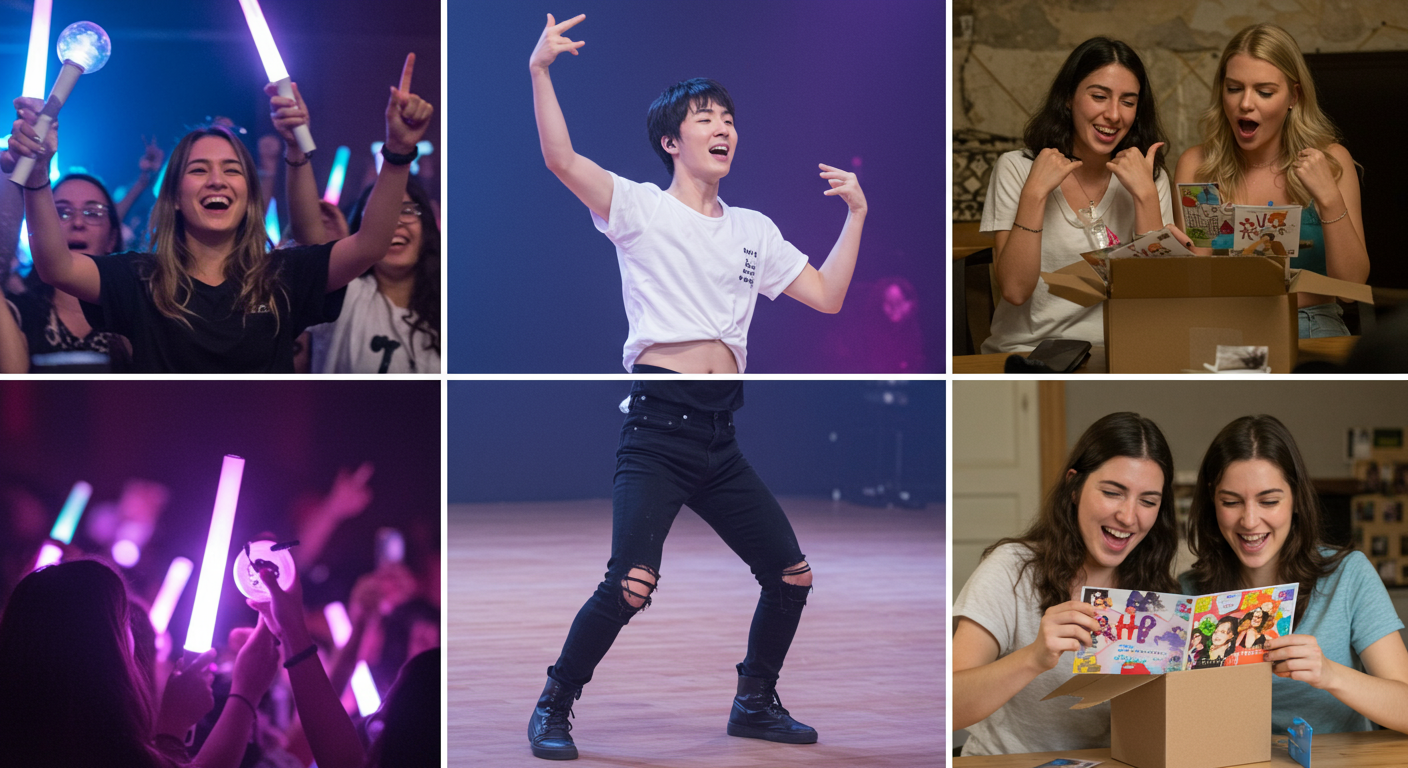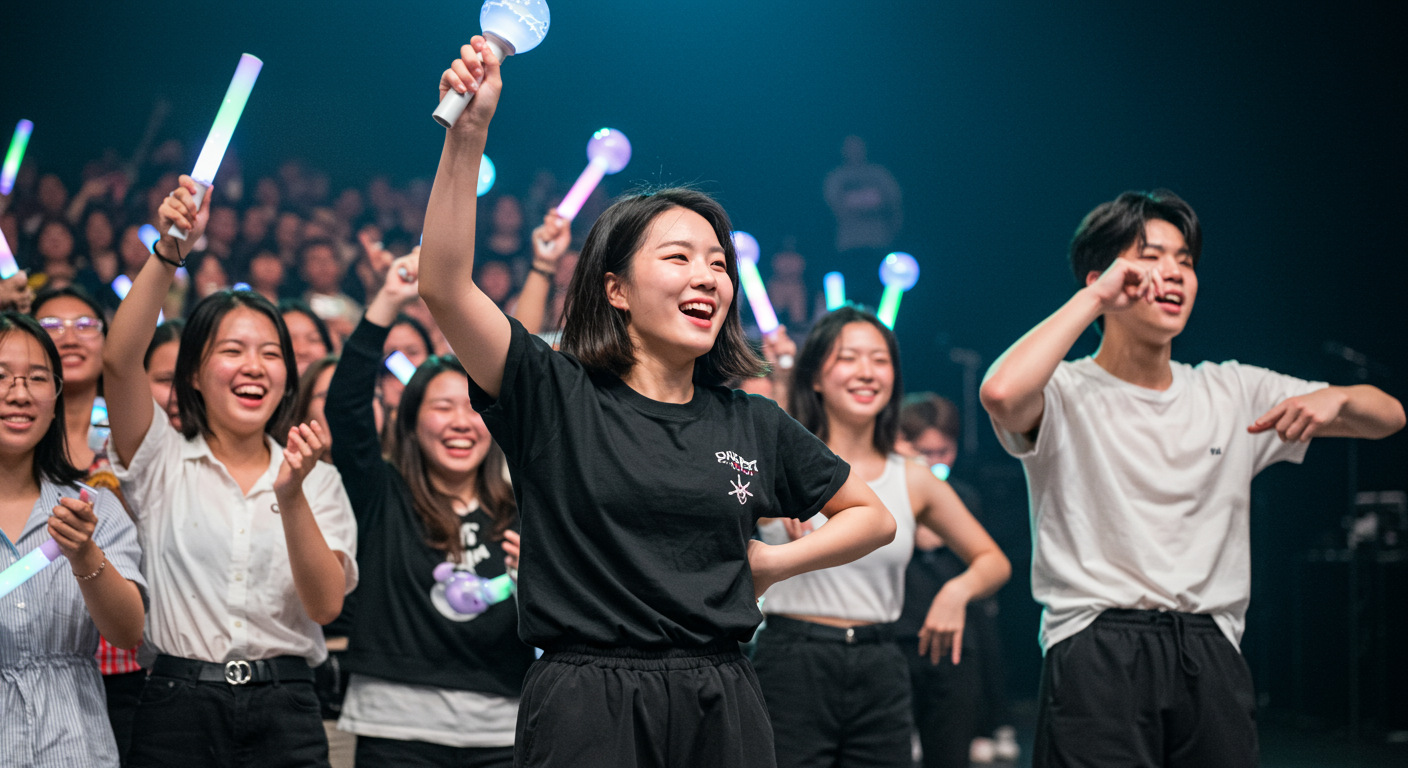The Global K-pop Phenomenon: Unpacking Parasocial Love and Its Cultural Impact
The Global K-pop Phenomenon: Unpacking Parasocial Love and Its Cultural Impact
Have you ever wondered what truly drives the global K-pop craze, beyond the catchy tunes and dazzling choreography? It’s a fascinating world, isn't it?
Honestly, when I first stumbled upon K-pop, I just saw bright lights and synchronized dancing. But then I started digging deeper, and boy, there’s so much more to it. We're talking about a cultural wave, Hallyu, that's reshaping identities and fostering intense connections around the globe. Recently, I had the incredible opportunity to dive into this with Italian journalist Marianna Baroli. We chatted about everything from the sheer joy of fan girling to the more complex, sometimes thorny, aspects of parasocial relationships and online fandoms. It really got me thinking: what exactly is the cost of all this adoration? And where do we go from here?
Table of Contents
 Description: "A vibrant, energetic K-pop concert scene with fans holding lightsticks, showing a diverse crowd immersed in the music. The atmosphere is electric and joyful, with bright stage lights in the background. Photo-realistic style, 600x350 pixels."
Description: "A vibrant, energetic K-pop concert scene with fans holding lightsticks, showing a diverse crowd immersed in the music. The atmosphere is electric and joyful, with bright stage lights in the background. Photo-realistic style, 600x350 pixels."
The Unstoppable Rise of K-pop: More Than Just Music
So, why exactly did K-pop manage to leapfrog Western music and conquer the world? It's not just one thing, you know. It's a whole package deal: unbelievably catchy tunes, visuals that could launch a thousand memes, and dance routines that make your jaw drop. But honestly, it's also the rigorous, almost military-like training system in Korea that churns out these incredibly polished performers. They're not just singers; they're entertainers, idols, almost mythical figures.
The K-pop landscape today? It’s a dynamic, ever-evolving beast. From the seasoned veterans like 2PM, who were doing their thing way back when, to groups like GOT7 who built immense loyalty, and the recent explosion of powerful girl groups like ITZY, NewJeans, and BLACKPINK, the industry keeps innovating. It’s a global powerhouse, no doubt, but that comes with its own set of pressures and challenges for the idols themselves. It’s not all glitter and glamour, unfortunately.
The Rise of Girl Groups: Shifting Dynamics
For a while, boy groups seemed to dominate the K-pop narrative, especially globally. But recently, we’ve seen an incredible surge in the popularity and influence of girl groups. They're pushing boundaries, experimenting with concepts, and frankly, delivering some of the most innovative music out there. It’s exciting to watch, and it definitely signals a shift in the industry's focus.
Behind the Scenes: The Architects of K-pop's Sound
It’s easy to focus on the idols, but we can't forget the producers and creative minds working tirelessly behind the scenes. People like Jay Park and DPR IAN, for example, are carving out their own unique paths, contributing to the genre's diversity and showing that K-pop is more than just idol groups. They’re really pushing the envelope, creatively.
Let's take a quick look at some key differences that set K-pop apart from traditional Western pop, shall we?
| Aspect | Western Pop | K-pop |
|---|---|---|
| Training System | Often organic, artist-driven development | Rigorous, multi-year idol training academies |
| Fan Interaction | More traditional, less structured | Highly organized fan clubs, fan signs, live streams, fan-artist engagement |
| Content Output | Album/single focused | Albums, MVs, reality shows, vlogs, behind-the-scenes, variety shows (constant engagement) |
 Description: "A behind-the-scenes shot of K-pop idols practicing intricate choreography in a dance studio, sweat on their brows but still smiling. The studio is minimalist and well-lit. Realistic photo style, focusing on dedication, 600x350 pixels."
Description: "A behind-the-scenes shot of K-pop idols practicing intricate choreography in a dance studio, sweat on their brows but still smiling. The studio is minimalist and well-lit. Realistic photo style, focusing on dedication, 600x350 pixels."
Hallyu's Embrace: K-pop's Deep Dive into Italian Culture
When Marianna shared her insights on how Italians are reacting to K-pop, it was fascinating. It’s not just about the music anymore; it's about a complete cultural experience. We talked about how popular Hallyu is in Italy, going way beyond what you might expect. I mean, remember when SEVENTEEN partnered with Airbnb? That’s not just a music event; it’s a lifestyle integration, pulling fans even deeper into the Korean wave.
And it’s not stopping at music. We’re seeing K-Beauty products flying off the shelves, Korean dramas captivating audiences, and even Korean food becoming a favorite in Italy. It’s a full-on cultural immersion, impacting everything from fashion to daily routines. It's kinda wild, but also makes perfect sense when you see how beautifully Korean and Italian cultures can sometimes complement each other.
Here are some ways Hallyu, the Korean Wave, is really making its mark on Italian culture:
- Music Consumption: K-pop groups topping charts and selling out arenas, shifting traditional music listening habits.
- Beauty Trends: K-Beauty products and skincare routines gaining immense popularity, influencing local beauty standards.
- Fashion and Style: K-pop idol fashion influencing youth trends, leading to new styles and brand collaborations.
- Culinary Exploration: Korean food becoming more accessible and popular, from traditional dishes to street food.
- Language and Education: Increased interest in learning Korean, leading to more language courses and cultural exchange programs.
 Description: "An Italian fan excitedly unboxing K-pop merchandise with a blurred background of a European cityscape. Her face is alight with joy, surrounded by vibrant album covers and photocards. Candid, lively photo style, 600x350 pixels."
Description: "An Italian fan excitedly unboxing K-pop merchandise with a blurred background of a European cityscape. Her face is alight with joy, surrounded by vibrant album covers and photocards. Candid, lively photo style, 600x350 pixels."
The Complex World of Fandom: Parasocial Relationships and Online Toxicity
Here’s where things get a bit complicated. We talked quite a bit about parasocial relationships – that one-sided bond where a fan feels like they truly know an idol, even though the idol has no idea who they are. It’s a fascinating psychological phenomenon, and K-pop's constant content output really fuels it. Idols are meticulously crafted to appear relatable, to share "glimpses" of their lives, and to foster that deep sense of connection.
But where there's intense passion, there can also be darkness. Online K-pop fandoms, while incredibly powerful and supportive, can also be toxic. We're talking about fan wars, extreme behaviors, and sometimes, a complete lack of objectivity when it comes to music reviews or even personal conduct. It makes you wonder, doesn't it? Can we truly be objective when we’re so deeply invested? It’s a tricky balance between genuine appreciation and unhealthy obsession.
Navigating the Darker Side: Toxicity in Online Fandoms
It's not all rainbows and lightsticks in the world of K-pop fandom. The online space, while a hub for community, can also become a breeding ground for toxicity. Intense rivalries between fan groups, harsh criticism (sometimes bordering on harassment) directed at idols or other fans, and an inability to accept differing opinions are all too common. It's a challenging environment to navigate, especially for younger fans.
Can We Be Objective? Fandom, Bias, and Music Criticism
This is a question I wrestle with myself. When you're a devoted fan, listening to an artist's new song or watching their performance, it's incredibly difficult to separate your personal feelings from a critical assessment. How much does our love for an idol influence our perception of their work? And how much does that affect the broader discourse around K-pop? It’s a constant battle between passion and perspective.
 Description: "A person scrolling through a phone, with glowing social media icons and angry emojis faintly visible in the background, representing online fan discussions. The person's expression is a mix of concern and fascination. Darker, slightly abstract illustration style, 600x350 pixels."
Description: "A person scrolling through a phone, with glowing social media icons and angry emojis faintly visible in the background, representing online fan discussions. The person's expression is a mix of concern and fascination. Darker, slightly abstract illustration style, 600x350 pixels."
Your Burning Questions: K-pop & Fandom Q&A
A parasocial relationship is a one-sided connection where a fan develops an emotional bond with an idol, feeling as if they know them personally, despite the idol being unaware of the fan's existence. This often happens due to the constant content idols put out (vlogs, live streams, social media) that creates an illusion of intimacy and accessibility. It's like feeling you're friends with a character in a TV show.
Hallyu, or the Korean Wave, significantly influences identity formation by exposing fans to new cultural norms, aesthetics, and values through K-pop, K-dramas, and K-beauty. For many, especially younger audiences, it can provide a sense of belonging to a global community, inspire new fashion choices, or even influence career aspirations. It offers an alternative cultural narrative to traditional Western influences, allowing individuals to explore and adopt new aspects into their own identities.
The sustainability of K-pop's intense fan culture is a complex question. While it drives immense success and dedication, it also leads to issues like burnout for idols, excessive pressure, and toxicity within fandoms. The industry is constantly adapting, and as global awareness grows, there's increasing scrutiny on mental health and fan behavior. For it to be truly sustainable, there might need to be a shift towards healthier fan-artist boundaries and greater industry support for idol well-being.
Conclusion: Where Do We Go Next?
Reflecting on my conversation with Marianna, it's clear that K-pop is so much more than just a musical genre. It's a complex, living ecosystem that influences global identity, fosters deep emotional connections (both healthy and otherwise), and constantly pushes the boundaries of entertainment. From the dedicated fan girling that builds communities to the challenges of navigating online toxicity and parasocial bonds, K-pop offers a unique lens through which to view the modern world's cultural landscape.
Where are we heading? It feels like we're moving towards a world where culture is increasingly fluid, blending and transforming across borders at lightning speed. K-pop is a prime example of this, isn't it? It challenges us to think about how we connect with media, how we form communities, and how we shape our own identities in an interconnected world. Let's keep exploring these fascinating intersections, with open minds and a little bit of critical thinking. What do you think is next for Hallyu? I’m genuinely curious.
© 2024 Your Blog Name. All rights reserved.
Comments
Post a Comment